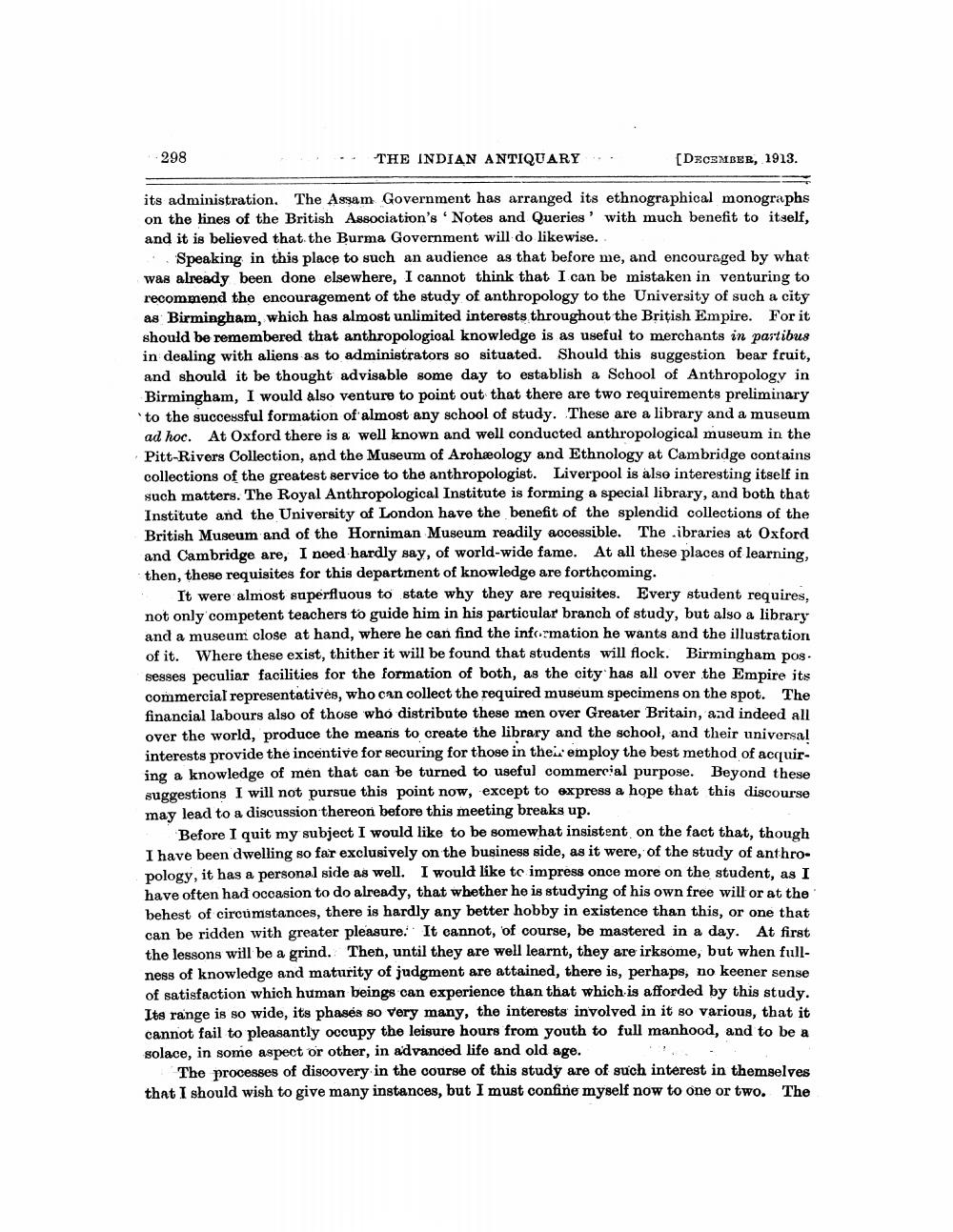________________
298
... THE INDIAN ANTIQUARY
[DECEMBER, 1913.
its administration. The Assam Government has arranged its ethnographical monographs on the lines of the British Association's Notes and Queries' with much benefit to itself, and it is believed that the Burma Government will do likewise.
Speaking in this place to such an audience as that before me, and encouraged by what was already been done elsewhere, I cannot think that I can be mistaken in venturing to recommend the encouragement of the study of anthropology to the University of such a city as Birmingham, which has almost unlimited interests throughout the British Empire. For it should be remembered that anthropological knowledge is as useful to merchants in partibus in dealing with aliens as to administrators so situated. Should this suggestion bear fruit, and should it be thought advisable some day to establish a School of Anthropology in Birmingham, I would also venture to point out that there are two requirements preliminary 'to the successful formation of almost any school of study. These are a library and a museum ad hoc. At Oxford there is a well known and well conducted anthropological museum in the Pitt-Rivers Collection, and the Museum of Archäology and Ethnology at Cambridge contains collections of the greatest service to the anthropologist. Liverpool is also interesting itself in such matters. The Royal Anthropological Institute is forming a special library, and both that Institute and the University of London have the benefit of the splendid collections of the British Museum and of the Horniman Museum readily accessible. The .ibraries at Oxford and Cambridge are, I need hardly say, of world-wide fame. At all these places of learning, then, these requisites for this department of knowledge are forthcoming.
It were almost superfluous to state why they are requisites. Every student requires, not only competent teachers to guide him in his particular branch of study, but also a library and a museum close at hand, where he can find the information he wants and the illustration of it. Where these exist, thither it will be found that students will flock. Birmingham pos. sesses peculiar facilities for the formation of both, as the city has all over the Empire its commercial representatives, who can collect the required museum specimens on the spot. The financial labours also of those who distribute these men over Greater Britain, and indeed all over the world, produce the means to create the library and the school, and their universal interests provide the incentive for securing for those in their employ the best method of acquir. ing a knowledge of men that can be turned to useful commercial purpose. Beyond these suggestions I will not pursue this point now, except to express a hope that this discourse may lead to a discussion thereon before this meeting breaks up.
Before I quit my subject I would like to be somewhat insistent on the fact that, though I have been dwelling so far exclusively on the business side, as it were, of the study of anthropology, it has a personal side as well. I would like to impress once more on the student, as I have often had occasion to do already, that whether he is studying of his own free will or at the behest of circumstances, there is hardly any better hobby in existence than this, or one that can be ridden with greater pleasure. It cannot, of course, be mastered in a day. At first the lessons will be a grind. Then, until they are well learnt, they are irksome, but when fullness of knowledge and maturity of judgment are attained, there is, perhaps, no keener sense of satisfaction which human beings can experience than that which is afforded by this study. Its range is so wide, its phasés so very many, the interests involved in it so various, that it cannot fail to pleasantly occupy the leisure hours from youth to full manhood, and to be a solace, in some aspect or other, in advanced life and old age.
The processes of discovery in the course of this study are of such interest in themselves that I should wish to give many instances, but I must confine myself now to one or two. The




